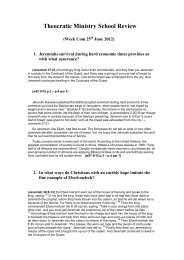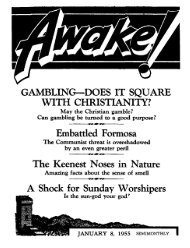1964 Awake! - Theocratic Collector.com
1964 Awake! - Theocratic Collector.com
1964 Awake! - Theocratic Collector.com
Create successful ePaper yourself
Turn your PDF publications into a flip-book with our unique Google optimized e-Paper software.
even a Greek but a Jew, a Hebrew, and<br />
his training had been in the Jewish religion<br />
and in the Hebrew language. He was<br />
taught at the feet of Gamaliel and proved<br />
outstanding not because of his literary abilities<br />
but because of his religious zeal. Further,<br />
Paul wrote <strong>com</strong>paratively little. The<br />
Christian Greek Scriptures are by no<br />
means a large volume, and yet Paul wrote<br />
only from two-sevenths to one-third of it.<br />
Even though it is quite likely that not all<br />
he wrote came down to us, he was not,<br />
first of all, a writer but a traveling preacher,<br />
a missionary, a public and house-tohouse<br />
minister, as he himself makes clear.<br />
-Acts 20:20; 2 Cor. 11:23-27.<br />
There is a great contrast between the<br />
writings of Paul and those of the Greek<br />
classicists. As well noted by a learned<br />
Greek scholar:<br />
"The style of Paul is altogether peculiar<br />
[uniquc}. Nothing like it, I believe, can be<br />
found outside of the New Testament. It is<br />
the style of a Jewish Rabbi rather than of<br />
11 classical Greek writer; but of a Rabbi of<br />
a very peculiar cast of character. His style<br />
is the natural outgrowth of these elements,<br />
to wit, the fiery impetuosity of his own na·<br />
ture, his thorough and strict Jewish educa·<br />
tion, and the characteristic peculiarities of<br />
the Christian theology which he inCUlcated.<br />
He abounds in imperfect parentheses, that<br />
is, sentences which intt'rrupt the flow of<br />
thought, and yet are so essential to the<br />
subsequent argument that they cannot be<br />
omitted .... He darts with inconceivable<br />
rapidity from thought to thought, so that<br />
one must be assiduously on the watch to keep<br />
him in sight. He gives himself no time to<br />
express one thought fully, before he hurries<br />
on to another; and multitudes of ideas are<br />
struggling in his soul for simultaneous utter·<br />
ance. Yet ... his thought <strong>com</strong>l's out, not only<br />
with perfect explicitness, but with warmth<br />
the most genial and eloquence unsurpassed."<br />
-History of the Books of the Bible, Dr.<br />
C. E. Stowe, pp. 343, 344.<br />
28<br />
JL<br />
Not that Paul wrote every one of his letters<br />
in this style, but this is especially true<br />
of his letter to the Romans, and of others<br />
to varying degrees. Yet could we imagine<br />
the foregoing being said of any of the Greek<br />
classical writers? Paul was not concerned<br />
with works of art, fine literature. His chief<br />
concern was substance, and the ones to<br />
whom he wrote as well as his own circumstances<br />
would be bound to influence his<br />
style. This is borne out by the fact that the<br />
modernist clergyman used Paul's letter to<br />
the Galatians as his criterion and it is to<br />
be expected that the letters which, like it,<br />
concerned themselves largely with doctrine<br />
would resemble it, which is the case with<br />
Romans and First and Second Corinthians.<br />
Just one fact alone points up the fallacy<br />
of the hypothesis under discussion, and<br />
that is that the apostle Paul wrote under<br />
inspiration. Can a <strong>com</strong>puter measure the<br />
workings of the holy spirit?<br />
Additionally, there is the testimony of<br />
early church historians. The works of such<br />
early writers and early collections of Bible<br />
manuscripts join in crediting Paul with<br />
every letter that bears his name. (For<br />
more evidence of this nature see a All Scriptu·re<br />
Is Inspired of God and Beneficial,"<br />
Ephesians through Hebrews.)<br />
In view of all the foregoing, what a feeble<br />
line of argument is put forth by this<br />
modernist clergyman who would rob Paul<br />
of the writership of most of the letters he<br />
wrote under divine inspiration and would<br />
prove that God's Word is not truth! How<br />
true are the words of Paul, "The wisdom<br />
of this world is foolishness with God," and<br />
of Jeremiah, "They have rejected the very<br />
word of Jehovah, and what wisdom do<br />
they have?"-l Cor. 3:19; Jer. 8:9.<br />
AWAKEI




